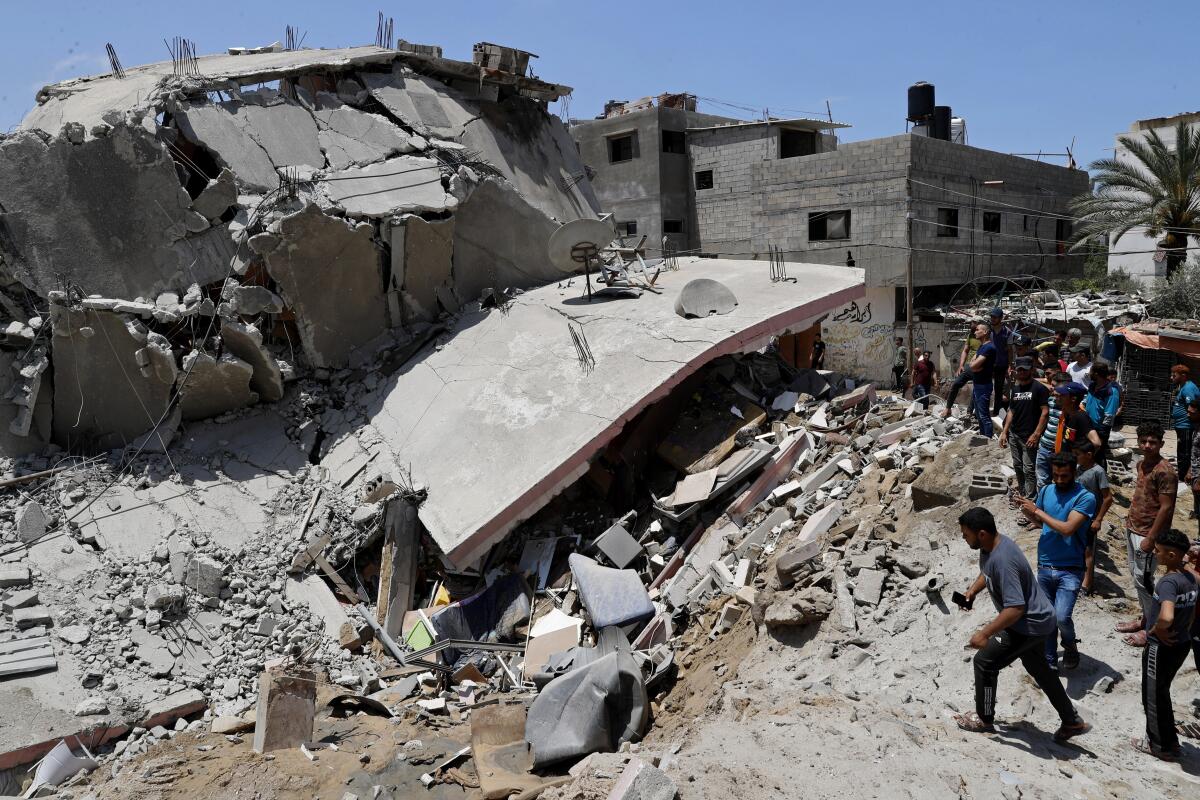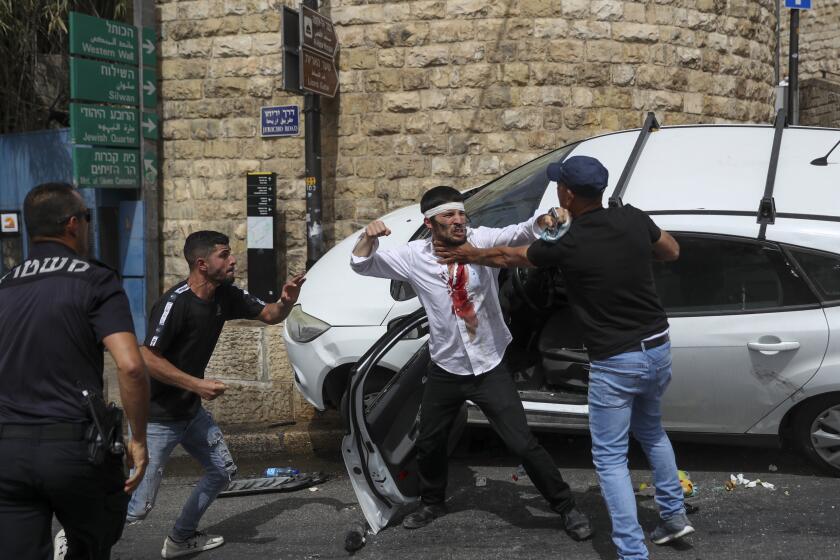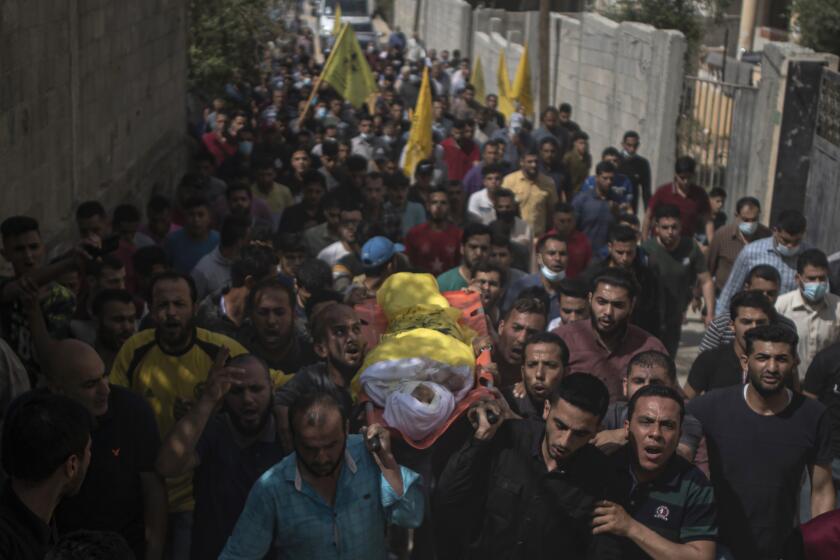U.S. steps up response to Israeli-Palestinian conflict after slow start

- Share via
WASHINGTON — Criticized for its slow response to escalating warfare, the Biden administration plunged into urgent diplomacy Wednesday, dispatching an emergency envoy to the Mideast, appealing directly to Israel’s prime minister and insisting Israelis and Palestinians deserve “equal measures” of security and freedom.
President Biden, who until now sought to keep Middle East crises on a back burner, telephoned Israeli Prime Minister Benjamin Netanyahu to urge calm in the conflict that has killed dozens of people, mostly Palestinians. In describing the conversation, Biden emphasized support for Israel’s “legitimate right” to defend itself and did not address Palestinian grievances.
“My expectation and hope is this will be closing down sooner ... rather than later,” Biden said.
Secretary of State Antony J. Blinken, who also spoke with Netanyahu, also voiced support for self-defense for Israel but added that the nation has an “extra burden” to avoid killing and wounding civilians. Israel has bombarded the Gaza Strip to take out Hamas militants launching rockets at Israeli cities. The Israeli airstrikes have destroyed residential complexes and killed children.
“There is a very clear and absolute distinction between a terrorist organization, Hamas, that is indiscriminately raining down rockets, in fact targeting civilians, and Israel’s response defending itself, that is targeting the terrorists who are raining down rockets on Israel,” Blinken said.
“But,” he added, “whenever we see civilian casualties and particularly when we see children caught in the crossfire losing their lives, that has a powerful impact. I think Israel has an extra burden in trying to do everything it possibly can to avoid civilian casualties, even as it is rightfully responding in defense of its people.”
Israel continues its assault on the Gaza Strip as the U.S. and others call for a cease-fire.
Blinken was responding to a reporter’s question at a briefing about whether Israel’s response was proportionate, given the lopsided death count. Israel has reported seven dead; Palestinian officials say more than 80 people, including more than a dozen children, have been killed in Gaza.
The secretary of State’s comments marked a small departure from the Trump administration’s refusal to call into question any of Israel’s actions, however provocative.
Still, many critics, including some diplomats and progressive Democrats, have chastised Biden for failing to speak out or act sooner, after Israeli police opened fire on Palestinian worshipers and protesters at Al Aqsa Mosque during the final days of the Muslim holy month of Ramadan last weekend.
Dov Waxman, professor of Israel studies at UCLA and author of several books about the conflict, said there were early and clear signs that Israelis and Palestinians were headed to calamity.
“What [Biden] wanted to do was signal this was not a priority and move slowly and cautiously while dealing with a complicated domestic agenda,” Waxman said. “The problem is the Middle East always intrudes into the agenda.”
Why is Biden treading so gingerly as violence escalates in Jerusalem, Israel and Palestinian territories? Four years of Trump’s pro-Israel policy, plus thorny domestic politics, leave Washington with fewer options than at any time in recent history.
The conflict at the mosque — Islam’s third-holiest site, in Jerusalem’s contested Old City — has broadened into the fighting now engulfing parts of the country and Palestinian territories. Unrest had been growing for weeks around the Old City over the planned eviction of some Palestinians from East Jerusalem and restrictions on access to religious sites during Ramadan.
Calls to Netanyahu from both Blinken and Biden in a single day marked an uptick in pressure the administration hopes to apply to the region’s officials. Until now, lower-level officials have spoken to their Israeli counterparts.
In his conversation, Blinken “emphasized the need for Israelis and Palestinians to be able to live in safety and security, as well as enjoy equal measures of freedom, security, prosperity and democracy,” State Department spokesman Ned Price said.
Price said the administration also reached out to Palestinian officials; Blinken tweeted later that he spoke with Palestinian Authority President Mahmoud Abbas. “I expressed condolences for the loss of life. I emphasized the need to end rocket attacks and de-escalate tensions,” Blinken wrote.
In the briefing, Blinken said the administration’s point person for Israeli-Palestinian affairs, Deputy Assistant Secretary of State Hady Amr, was heading to the region for meetings with Israeli and Palestinian officials.
Biden has not appointed an ambassador to Israel nor a consul for the Palestinian territories, which has complicated direct communication with players on the ground.
Amr, who has long experience in the region, “will urge a de-escalation of violence,” Blinken said. “We are very focused on this.”
The violence between Israel and Palestinian militants goes on with an Israeli airstrike killing a Hamas commander and rocket fire from Gaza causing a death.
Calls from the U.S., the United Nations and Europe for both sides to scale down their military actions have gone unheeded. Hamas and Islamic Jihad, another militant group fighting in Gaza, have launched hundreds of rockets into Israel in the last 72 hours, including some that have targeted large cities. Israel used fighter jets to bomb sections of the Gaza Strip.
Blinken described images from the Gaza Strip and Israel as “harrowing,” and said, “The loss of any human life is a tragedy. We believe Israelis and Palestinians equally deserve to live with safety and security.”
He repeated condemnation “in the strongest terms” of rocket attacks from Gaza and reiterated that the administration “fully” supports “Israel’s legitimate right to defend itself.”
Blinken spoke upon the State Department’s release of its annual report on freedom of religion around the world.
Daniel Nadel, a State Department official who presented the report with Blinken, was asked whether Israel had interfered with Palestinians’ freedom of religion at Al Aqsa Mosque.
“We have long supported status quo around Haram al Sharif/Temple Mount to achieve a just and lasting peace,” he said, using the Arabic and English names for the hill where Al Aqsa sits, which is also holy to Jews.
Then-President Trump picked away at that status quo by declaring Jerusalem to be Israel’s capital instead of waiting for a negotiation to settle the issue. Palestinians claim East Jerusalem as a capital for a future independent state.
The Israeli military, briefing foreign reporters Wednesday, said it attempts to avert civilian casualties, sometimes sending warnings to the occupants of Gaza buildings before bombing them. But Palestinians were dismissive of the claim, expressing outrage over the dropping of missiles on the densely populated Gaza Strip.
“We are ready to enhance and expand our operations,” Israeli military spokesman Jonathan Conricus said in a briefing Wednesday.
The main prosecutor of the International Criminal Court said Wednesday that she is watching for potential war crimes or crimes against humanity on all sides. “I note with great concern the escalation of violence in the West Bank, including East Jerusalem, as well as in and around Gaza,” prosecutor Fatou Bensouda wrote.
More to Read
Get the L.A. Times Politics newsletter
Deeply reported insights into legislation, politics and policy from Sacramento, Washington and beyond. In your inbox twice per week.
You may occasionally receive promotional content from the Los Angeles Times.














